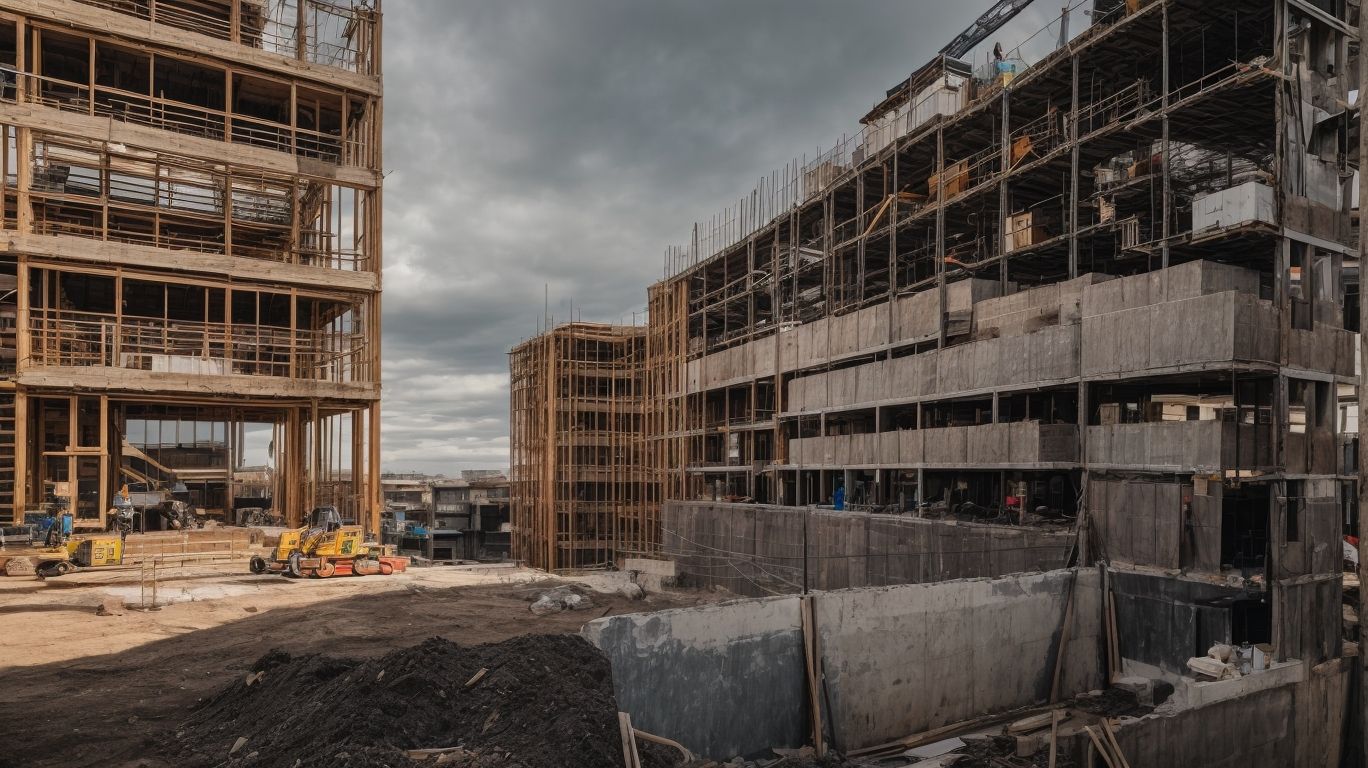
Are you struggling to keep your construction projects on track and within budget? With the increasing demand for new properties, managing construction and contractors has become a daunting task for property developers. In this article, we will explore effective strategies and techniques that can help you successfully manage construction projects and contractors.
What Is Property Development?
Property development is the process of acquiring land or existing properties and transforming them into profitable assets. This involves tasks such as obtaining permits, designing and planning, construction, and marketing. Property developers are responsible for overseeing the entire development process, including managing contractors, architects, and other professionals. Their goal is to create spaces that meet market demands and generate a profit.
To be successful in property development, one must have a comprehensive understanding of market trends, financial analysis, and legal factors. By identifying opportunities, assessing risks, and efficiently coordinating resources, developers can optimize the value of their projects.
What Are the Roles and Responsibilities of a Property Developer?
As property development continues to be a lucrative industry, it’s important to understand the roles and responsibilities of a property developer. Beyond just overseeing the construction process, a property developer is responsible for a variety of tasks that are crucial to the success of a development project. In this section, we will delve into the diverse responsibilities of a property developer, including identifying and acquiring land, conducting market research and feasibility studies, securing financing and investment, obtaining necessary permits and approvals, and managing construction and contractors.
1. Identifying and Acquiring Land
Identifying and acquiring land is the first crucial step in property development. Here are the key steps involved in this process:
- Conduct a thorough market analysis to identify areas with potential for growth and demand.
- Research zoning laws and regulations to ensure the land is suitable for the intended development.
- Engage with real estate agents, brokers, and property owners to find available land options.
- Evaluate the suitability of each potential site based on factors like location, access to amenities, and infrastructure.
- Negotiate with landowners to secure the purchase or lease agreement.
- Conduct due diligence to assess any legal, environmental, or financial constraints associated with the land.
- Obtain necessary permits and approvals from local authorities before finalizing the acquisition.
Pro-tip: Building a strong network with local professionals and staying informed about market trends can help property developers effectively identify and acquire land.
2. Conducting Market Research and Feasibility Studies
Conducting market research and feasibility studies is a crucial step in property development. It helps property developers assess the viability of their projects and make informed decisions. Here are the steps involved in conducting market research and feasibility studies:
- Identify the target market and demographics.
- Analyze market trends, including supply and demand dynamics.
- Evaluate the competition and assess their offerings.
- Analyze the local economy and economic indicators.
- Assess the feasibility of the project based on financial projections and return on investment calculations.
- Consider the legal and regulatory requirements for the project.
By conducting thorough market research and feasibility studies, developers can minimize risks and maximize the success of their projects.
3. Securing Financing and Investment
Securing financing and investment is a crucial step in property development. Here are the steps involved in this process:
- Evaluate project feasibility and determine funding requirements.
- Create a comprehensive business plan to attract potential investors.
- Research and identify potential financing options, such as loans or partnerships.
- Prepare financial projections and documents required by lenders or investors.
- Approach financial institutions, private investors, or crowdfunding platforms to secure funding.
- Negotiate terms and conditions, including interest rates, repayment schedules, and equity stakes.
- Close the deal and finalize the financing arrangements.
- Ensure compliance with legal and regulatory requirements related to securing financing and investment.
- Monitor and manage cash flow throughout the project to ensure proper utilization of funds.
4. Obtaining Necessary Permits and Approvals
To successfully obtain the necessary permits and approvals for property development, property developers must follow a series of important steps:
- Research: The first step is to thoroughly research and identify all of the specific permits and approvals required for the project.
- Application: Once the necessary permits and approvals have been identified, the next step is to prepare and submit all of the required documentation to the relevant authorities.
- Review: The authorities will then review the application and may conduct necessary inspections to ensure that all requirements are met.
- Compliance: It is crucial to ensure that the project complies with all of the requirements and regulations set by the authorities.
- Approval: Once the authorities are satisfied with the project’s compliance, they will grant the necessary permits and approvals.
Fact: Obtaining necessary permits and approvals is a crucial step in property development, as it ensures that the project meets all legal and regulatory standards.
5. Managing Construction and Contractors
Managing construction and contractors is a crucial aspect of property development. Here are the steps involved in effectively managing construction and contractors:
- Pre-construction planning: Develop a detailed construction plan, including timelines, budgets, and required resources.
- Hiring and managing contractors: Select reputable contractors, negotiate contracts, and oversee their work throughout the project.
- Creating and managing project budget: Monitor expenses, track costs, and ensure the project stays within budget.
- Ensuring compliance with building codes and regulations: Stay up-to-date with local regulations and ensure all construction activities comply with them.
- Overseeing construction progress and quality: Regularly inspect the construction site to ensure work is progressing as planned and meets quality standards.
- Managing project timeline and deadlines: Monitor project milestones, track progress, and ensure timely completion of each phase.
By following these steps, property developers can effectively manage construction and contractors, ensuring a successful and timely completion of their projects.
What Are the Steps Involved in Managing Construction and Contractors?
Property developers play a crucial role in ensuring the successful completion of construction projects. To achieve this, they must effectively manage the construction process and contractors involved. In this section, we will discuss the step-by-step process of managing construction and contractors, from pre-construction planning to overseeing the project’s timeline and deadlines. Understanding these steps will give us insight into the complexities of property development and the critical role of project management in its success.
1. Pre-construction Planning
Pre-construction planning is a crucial step in property development, ensuring a smooth and successful project. The following steps outline the process:
- Define project objectives and goals.
- Conduct a feasibility study to assess the viability of the project.
- Obtain necessary permits and approvals.
- Create a detailed project timeline and schedule.
- Develop a comprehensive budget, accounting for all construction costs.
- Plan and coordinate site logistics and layout.
- Engage with architects and engineers to design the project.
- Identify and mitigate potential risks and challenges.
Pro-tip: Invest ample time and resources in pre-construction planning to ensure a solid foundation for your project. This will help minimize unexpected delays and cost overruns, leading to a more successful and profitable development.
2. Hiring and Managing Contractors
When it comes to hiring and managing contractors in property development, following a systematic approach is crucial. Here is a list of steps to consider:
- Clearly define project requirements and scope of work.
- Research and identify potential contractors.
- Request bids or proposals from contractors.
- Evaluate and compare bids based on factors like cost, experience, and reputation.
- Interview and select the most suitable contractor.
- Establish a detailed contract outlining expectations, timelines, and payment terms.
- Regularly communicate and collaborate with the contractor to ensure clarity and alignment.
- Maintain regular site visits and inspections to monitor progress and quality.
- Address any issues or conflicts promptly and professionally.
- Keep records of all communication, changes, and payments for documentation purposes.
True story: In a property development project, a developer diligently followed the steps mentioned above and hired a contractor renowned for their quality work. Through effective communication and regular site visits, the developer ensured that the contractor adhered to the project timeline and delivered exceptional results. The successful partnership between the developer and contractor led to the timely completion of the project, exceeding the client’s expectations.
3. Creating and Managing Project Budget
Creating and managing a project budget is a crucial aspect of property development. Here are the necessary steps to ensure effective budget management:
- Estimate costs: Identify all expenses involved in the project, including land acquisition, permits, labor, materials, and contingency funds.
- Create a detailed budget plan: Break down the estimated costs into specific categories and allocate appropriate amounts for each.
- Monitor and track expenses: Regularly review actual expenditures against the budget plan to identify any deviations and take corrective actions if necessary.
- Adjust budget as needed: If unexpected costs arise or changes occur during construction, make necessary adjustments to the budget to ensure financial stability.
- Communicate with stakeholders: Keep all relevant parties informed about the budget status and any changes that may impact the project.
By following these steps, property developers can effectively create and manage a project budget, ensuring financial control throughout the development process.
4. Ensuring Compliance with Building Codes and Regulations
Ensuring compliance with building codes and regulations is essential for property developers to avoid legal issues and ensure the safety and quality of construction projects.
- Thoroughly research local building codes and regulations to fully understand the requirements.
- Collaborate with architects and engineers to design plans that meet all code requirements.
- Submit building permit applications and all necessary documents to obtain approval.
- Schedule and coordinate inspections with local authorities at various stages of construction.
- Promptly address any deficiencies or violations identified during inspections.
- Maintain accurate records and documentation of all inspections and approvals.
- Regularly review and update construction practices to align with evolving codes and regulations.
5. Overseeing Construction Progress and Quality
Overseeing construction progress and quality is a crucial responsibility of property developers. To effectively manage construction, here are some steps involved:
- Regular site visits to monitor progress and ensure compliance with plans and specifications.
- Inspecting construction quality to identify any issues or defects that need to be addressed.
- Coordinating with contractors and subcontractors to keep them informed about project goals and expectations.
- Keeping track of project timelines and deadlines to ensure timely completion.
To ensure smooth progress and high-quality construction, property developers should also consider:
- Establishing clear communication channels with contractors and addressing any issues promptly.
- Providing necessary resources and support to contractors to facilitate their work.
- Encouraging collaboration and teamwork among all parties involved in the construction process.
- Regularly reviewing and evaluating construction progress to identify areas for improvement.
6. Managing Project Timeline and Deadlines
Managing project timeline and deadlines is crucial in property development to ensure timely completion and avoid costly delays. Here are key steps to effectively manage project timeline and deadlines:
- Create a detailed project schedule outlining tasks, milestones, and deadlines.
- Set realistic timelines for each task, considering factors like procurement, permits, and construction.
- Regularly monitor progress and update the schedule accordingly.
- Identify potential risks and develop contingency plans to mitigate delays.
- Maintain open communication with contractors to ensure timely execution of work.
- Implement strict quality control measures to avoid rework and delay.
To successfully manage project timeline and deadlines, property developers should prioritize efficient planning, proactive monitoring, and effective communication. Regular site visits and inspections can help identify issues early, while building strong relationships with contractors fosters collaboration and adherence to timelines. By following these steps, property developers can minimize delays and ensure projects are completed on time.
What Are the Common Challenges Property Developers Face in Managing Construction and Contractors?
As property developers take on the massive task of building and managing construction projects, they often face a multitude of challenges in the process. In this section, we’ll discuss the common hurdles that property developers encounter when managing construction and contractors. We’ll delve into the complexities of budget and cost management, the importance of effective communication and coordination, and the impact of delays and setbacks on the overall project. By understanding these challenges, we can gain a better understanding of the demanding role of property developers in the construction industry.
1. Budget and Cost Management
Proper budget and cost management is crucial for property developers to ensure the success of their construction projects. To effectively manage the budget and costs, developers should follow these steps:
- Create a detailed project budget, including all anticipated expenses and contingencies.
- Regularly review and track expenses to ensure they stay within the budget.
- Engage in cost-saving measures, such as negotiating prices with suppliers and contractors.
- Implement efficient cost control mechanisms, such as regular financial reporting.
- Monitor the progress of the project and make adjustments as needed to maintain financial stability.
To overcome budget and cost management challenges, property developers should:
- Adopt careful planning and accurate budgeting from the start.
- Prioritize effective communication and collaboration with contractors to avoid cost overruns.
- Conduct regular site visits and inspections to identify potential cost-saving opportunities.
- Build strong relationships with contractors based on mutual trust and transparency.
2. Communication and Coordination Issues
Communication and coordination issues can arise during construction projects, leading to delays and setbacks. Property developers can mitigate these challenges by following a systematic approach:
- Establish Clear Communication Channels: Create a communication plan to ensure all parties involved are informed and updated regularly.
- Regular Meetings and Reporting: Conduct frequent meetings to address any issues, provide updates, and make decisions collectively.
- Effective Documentation: Maintain accurate records of all communication, including contracts, change orders, and project specifications.
- Collaborative Problem-Solving: Foster a collaborative environment that encourages open communication and problem-solving among team members.
- Proactive Coordination: Regularly assess project milestones, timelines, and dependencies to identify any coordination issues and take corrective measures.
By implementing these steps, property developers can effectively address communication and coordination issues, ensuring smooth construction projects.
3. Delays and Setbacks
Delays and setbacks can have a significant impact on property development projects, resulting in financial losses and schedule disruptions. To mitigate and manage these issues, there are several steps that can be taken:
- Proactive Planning: It is important to develop a detailed project plan with realistic timelines and contingencies for potential delays.
- Regular Communication: Maintaining open and effective communication channels with contractors is crucial in addressing any issues promptly and finding collaborative solutions.
- Risk Assessment: Identifying potential risks and developing strategies to mitigate them before they turn into delays or setbacks is essential.
- Contractor Performance Monitoring: Continuously monitoring contractor performance ensures adherence to timelines and quality standards.
- Resource Allocation: Properly allocating resources, such as manpower, equipment, and materials, is crucial in ensuring that they are available when needed.
By implementing these steps, property developers can minimize the impact of delays and setbacks, ensuring timely completion of construction projects.
How Can Property Developers Overcome These Challenges?
As property developers take on the complex task of managing construction projects and contractors, they face numerous challenges. In this section, we will discuss the strategies and techniques that property developers can utilize to overcome these challenges and ensure a successful project. From careful planning and budgeting to effective communication and collaboration, we will explore the key factors that contribute to the smooth management of construction projects. Additionally, we will delve into the importance of regular site visits and inspections, as well as building strong relationships with contractors, to create a harmonious working environment.
1. Careful Planning and Budgeting
Careful planning and budgeting are essential steps in property development, ensuring the successful execution of projects and maintaining financial stability.
- Establish clear project goals and objectives.
- Conduct thorough market research and feasibility studies.
- Create a detailed project plan, including specific timelines and milestones.
- Accurately estimate costs, taking into account construction, permits, and professional fees.
- Develop a comprehensive budget that includes contingencies and unexpected expenses.
- Regularly review and update the budget throughout the project.
- Implement cost-saving strategies without compromising on quality.
- Monitor expenses and adjust budget allocations as necessary.
- Explore financing options and secure necessary funding.
2. Effective Communication and Collaboration
Effective communication and collaboration are essential for the success of property development projects. To ensure efficient teamwork and smooth coordination, property developers should follow these steps:
- Establish clear lines of communication and designate a central point of contact for all project-related communication.
- Hold regular team meetings to provide updates, address concerns, and align on project goals.
- Utilize project management software or tools to facilitate communication, document sharing, and task tracking.
- Encourage open and transparent communication among all stakeholders, including contractors, subcontractors, and suppliers.
- Ensure that all project documentation, such as plans, specifications, and contracts, are easily accessible and up-to-date for all team members.
- Regularly communicate project milestones, deadlines, and any changes or updates to the project plan.
- Provide timely feedback and clarification to contractors to promptly address any issues or concerns.
- Promote a collaborative and inclusive work environment that values input from all team members.
- Conduct regular progress meetings to assess project status, address challenges, and identify opportunities for improvement.
- Celebrate successes and recognize the contributions of individual team members to foster a positive and collaborative project culture.
3. Regular Site Visits and Inspections
Regular site visits and inspections are essential for property developers to ensure the progress and quality of construction. Here are the steps involved in conducting these visits and inspections:
- Establish a schedule for regular site visits to monitor construction activities.
- Inspect the site for compliance with building codes and regulations.
- Ensure that the work being done meets the project’s specifications and maintains high-quality standards.
- Identify any potential issues or deviations from the original plans and promptly address them.
- Document the progress and take photographs to keep a record of the construction process.
To make the most out of these site visits and inspections, property developers should:
- Effectively communicate with contractors and address any concerns or questions during the visits.
- Collaborate with project stakeholders to ensure everyone is on the same page.
- Review the construction timeline and deadlines to ensure timely completion.
- Provide feedback and guidance to contractors to maintain high-quality workmanship.
4. Building Strong Relationships with Contractors
Building strong relationships with contractors is crucial for successful property development. Here are key steps to foster positive relationships:
- Establish clear expectations and project goals.
- Communicate effectively to ensure everyone is on the same page.
- Provide timely and fair payments to maintain trust.
- Recognize and appreciate their work to build morale.
- Promote open and transparent collaboration throughout the project.
True story: A property developer in London faced challenges with contractors due to miscommunication and delays. By implementing regular team meetings, offering incentives for early completion, and addressing concerns promptly, they were able to cultivate a strong relationship. This resulted in improved productivity, timely project completion, and continued partnerships with the contractors on future projects.








